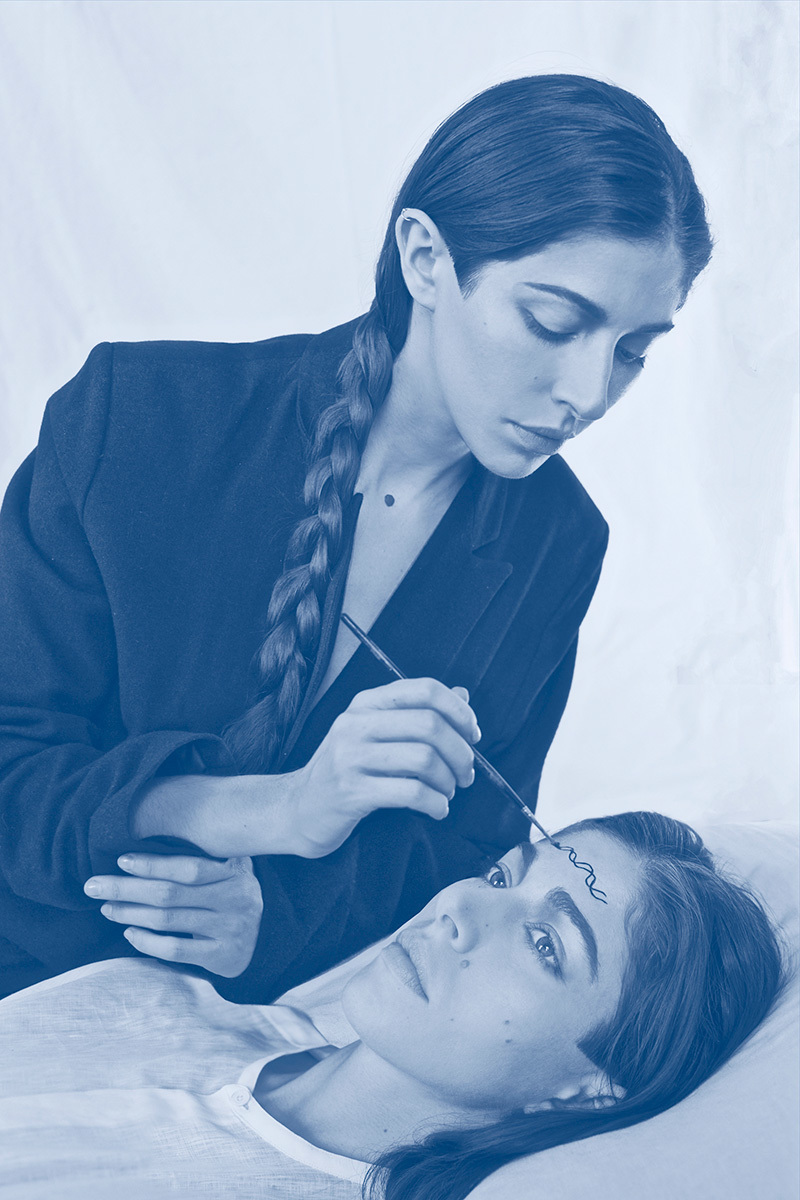When she’s not creating peculiar chorus hooks, translating her songs into Japanese, or touring across the globe as the front lady of Chairlift, Caroline Polachek can usually be found writing delectably good electropop in her hometown of Brooklyn. On the day we speak, she has swapped her comfortable New York haunt for an unusually grey and wet Los Angeles. It’s a change of creative scenery that she has always liked, claiming Brooklyn as her “inspiring, psycho-geographical graveyard of memories,” while embracing LA’s “wild and kind of messed up” spirit, too. Both cities, evidently, are two juxtaposing ingredients in the Chairlift concoction that have helped make the band’s decade-long career so fruitful.
This year spells change, though, both for Caroline and the band. As Chairlift — in her own words — is now complete, she’s about to set off on one final tour with her bandmate Patrick Wimberly. But fans who feel sad at the idea of a Chairlift-less future in music don’t need to worry: there’s some solo work in the pipeline, and in the eyes of Caroline, it could be her most personal work to date.
Taking a break from working on her first “straight-down-the-line” record released under her own name, Caroline had the following exchange with The Fifth Sense, in which she discussed ambient music going mainstream, the dogmatic work of Danny L Harle, and her undying love for the smell of airplane soap.

You’ve written two albums as a solo artist before, and are working on your third right now. What does working on music solo do to your headspace? Do you find it isolating? Refreshing?
It’s kind of neither. You know, the only word I can use to describe it is loaded! Because it’s all metaphors in my head that I’m putting out in the world, and it feels like a more poetic project than when you’re working with someone else. Maybe that’s just because everything exists in your mind, and so you feel this responsibility to it; like if you’re not going to carry it through, no one will. When you’re working with some else, that responsibility is a little bit more diffused.
You just released Drawing the Target Around The Arrow, which is entirely instrumental. Do you think that genre affects the senses in a manner that’s different from traditional pop?
Absolutely. By removing a voice, you give people the space to impose their own narrative. Regardless of how abstract the vocals are, as soon as you have a voice, all of a sudden there’s a male or female identity; there’s a language; we… know where they’re from. People have a more sensual relationship with sound, and when you remove all of [those things], they daydream [while listening] to it. I wanted people to live with the music rather than feel like they needed to sit down and understand it. The beauty comes from not [having to] actively listen.
Is it strange to see it critiqued in the same way as pop music then?
It’s a little bizarre, but I’ve been kind of impressed by some of the writing that has come from it. I was fully prepared for people to be like, “What is this?” You know? Just because the context of my past work doesn’t really set [anyone] up easily for it. I’ve actually been quite surprised about how open minded pop listeners have been to ambient music.
Why do you think that is?
I think it’s because music has become so experimental in the pop realm, too. Frank Ocean, Kanye, Beyoncé… all of these artists are using ambient music in their albums, so people are [finding it easier to] access it. Our generation definitely has a new relationship with ambient music.
You worked with PC Music’s Danny L Harle on “Ashes of Love,” which made it on to the soundtrack for Forza Horizon 3 (a car racing game)! What’s it like having your music loved by ‘bro’ video game-playing types?
Oh, it’s amazing! It’s not my first time having music in a game either. Chairlift has done that quite a few times now and [the response is] always awesome!
How did that whole collaboration come about?
Basically, Danny reached out after hearing a song that Chairlift did that was in Japanese, and I think he just loved the aesthetic of that song. I took a listen to his music and my mind was just blown that someone was making techno with baroque harmony changes! He came to New York and we had a drink together before working in the studio and I immediately felt [like] I was meeting my little brother. We only had one day in the same city together, so we wrote the foundations of it and then passed notes back and forth over email for six months, then met again to, of course, rewrite it!
If you feel very strongly about an issue and you have a podium, then I think it’s irresponsible not to use it
What was it like trying to dissect his musical style?
Everything [Danny] does is so dogmatic and in your face. If anything is too subtle, he’ll just reject it, and I found that to be really fun. He wanted [it] to be a super tragic, Miami Freestyle song. It was actually quite hard to come up with lyrics that [suited] his style. I can say that we’re working on more stuff together!
Do you think that musicians have a responsibility to use their voice as activists as well as artists?
I think it completely depends on how you feel as an artist. If you feel very strongly about an issue and you have a podium, then I think it’s irresponsible not to use it. But if you don’t feel strongly about things, then I think it’s potentially damaging to take attention away from the people who [do] by getting on board halfheartedly, or by being an echo chamber.
Some artists don’t speak so specifically about political issues, but you can feel it in their work or their presence on social media. Nicolas Jaar is a good example. But then there are other artists, like Grimes, who are brilliant at gathering attention and organizing people. I think it’s beautiful; that it comes down to how you communicate with people as an artist and [asking yourself], “How can I use this language that I’ve created?”

Musicians are stereotyped as sort of free-spirited people. Do you have a plan for how the future might look?
In the sense that I’m already thinking about 2018, yeah. I have a goal map that I’m trying to stick to and so far, I’m on schedule!
Sometimes scents can be the strongest triggers when recalling the past. What are your favorite smells, and are there any that bring back great memories?
I love the smell of old books; that dusty, kind of vanilla smell.
Fall leaves after they’ve been on the ground for a couple of days. When I was a kid, I put a bunch of them in a box because I loved the smell of them, and I thought, “I’m just gonna keep this shoebox in my closet so I can smell them whenever I want!” Of course, the smell went away after about a month! But I thought I was a very smart seven-year-old when I thought I could smell that box of leaves whenever I wanted.
Obviously skunk! I love the smell of skunk.
I love the smell of fog machines! I don’t think they actually smell good, but I have such positive memories associated with them that I just [smell the smoke] and feel like I’m having a good time.
There’s an almond hand soap that AirFrance uses. It’s so nice. I’ve considered stealing the bottles but they bolt it down – probably because they know how good it smells!
They always do that with really nice soaps in hotels too, as if to say “That’s not going anywhere!”
I know! Damn it.
Credits
Text Douglas Greenwood
Photography Amanda Vincelli
